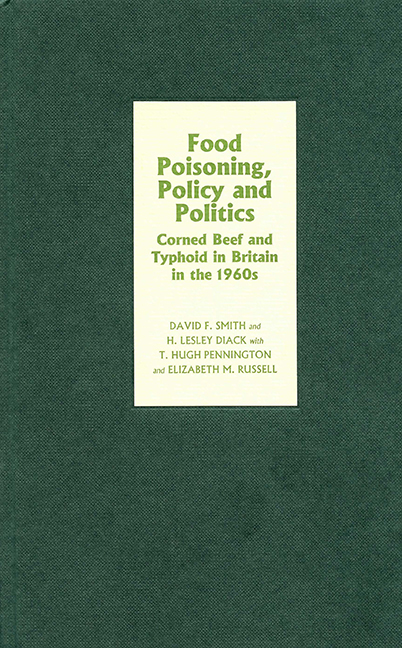Book contents
- Frontmatter
- Contents
- List of illustrations
- Preface and acknowledgements
- Abbreviations used in text
- Abbreviations used in footnotes
- 1 The earlier history of typhoid and food poisoning
- 2 The 1963 corned beef-associated typhoid outbreaks in Harlow, South Shields and Bedford
- 3 The Aberdeen typhoid outbreak
- 4 The medical officer of health, the media and the public in the Aberdeen typhoid outbreak
- 5 Ministers, officials and the Aberdeen typhoid outbreak
- 6 The Milne Committee of Enquiry
- 7 The recommendation on the inspection of overseas meat plants: the roles of existing policy agendas, and interdepartmental and inter-professional tensions
- 8 The disposal of suspect canned meat: the priority of politics over technical advice
- 9 British action to encourage improvements in Argentine meat hygiene, 1964 to 1969
- 10 Summary and conclusions, and food safety since 1964
- Appendix: Recommendations of the Milne Committee
- Bibliography
- Index
9 - British action to encourage improvements in Argentine meat hygiene, 1964 to 1969
Published online by Cambridge University Press: 24 October 2017
- Frontmatter
- Contents
- List of illustrations
- Preface and acknowledgements
- Abbreviations used in text
- Abbreviations used in footnotes
- 1 The earlier history of typhoid and food poisoning
- 2 The 1963 corned beef-associated typhoid outbreaks in Harlow, South Shields and Bedford
- 3 The Aberdeen typhoid outbreak
- 4 The medical officer of health, the media and the public in the Aberdeen typhoid outbreak
- 5 Ministers, officials and the Aberdeen typhoid outbreak
- 6 The Milne Committee of Enquiry
- 7 The recommendation on the inspection of overseas meat plants: the roles of existing policy agendas, and interdepartmental and inter-professional tensions
- 8 The disposal of suspect canned meat: the priority of politics over technical advice
- 9 British action to encourage improvements in Argentine meat hygiene, 1964 to 1969
- 10 Summary and conclusions, and food safety since 1964
- Appendix: Recommendations of the Milne Committee
- Bibliography
- Index
Summary
Introduction
The visit to South America in early 1964 of Leo Grace, MAFF's chief technical adviser on meat inspection, not only showed that two plants were using untreated water. Grace was also shocked by the run-down and unhygienic state of most meat plants, and the disorganisation of the inspection service. Attempts by the British to apply pressure upon the South American governments to remedy this situation were not underway by the time of the Aberdeen outbreak, but the matter was pursued soon afterwards. The Milne Committee recommended that ‘the hygienic requirements to be observed by establishments exporting meat and meat products to this country should be set out in as clear and detailed a manner as possible’, but upon publication of the report, the Secretary of State for Scotland was able to announce that it was already being attended to. He did not admit, however, that the responses of several countries, including Argentina, had not been satisfactory. This chapter will follow the efforts to persuade the Argentine government to clean up their meat industry and to improve their meat inspection service. Similar problems occurred with other South American countries, but we will focus on Argentina since it produced the corned beef that was associated with the 1963 to 1964 typhoid outbreaks. Policy debate revolved around the ‘official certificate procedure’ which was the responsibility of one of MAFF's divisions, and which aimed to safeguard public health by regulation of overseas meat industries. It was this division which played a leading role, but, as we will see, its proposals were sometimes resisted by other MAFF divisions and other ministries. Eventually the meat plants were improved, largely for commercial reasons, but eight years after the Aberdeen typhoid outbreak, the control of Argentine meat plant hygiene was still unsatisfactory.
The ‘official certificate’ system for public health approval was described in Chapter 2. As for animal health approval, the regulations applying to most countries were embodied in the Diseases of Animals Act, 1950, and the Importation of Carcasses and Animal Products Orders, 1954 and 1960, but the core regulations relating to South America dated to the Bledisloe agreement of 1928.
- Type
- Chapter
- Information
- Food Poisoning, Policy and PoliticsCorned Beef and Typhoid in Britain in the 1960s, pp. 253 - 286Publisher: Boydell & BrewerPrint publication year: 2005



